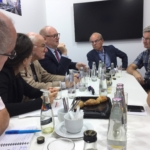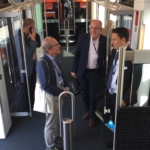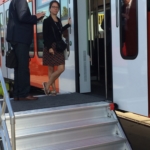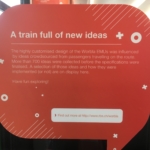EPF’s autumn General Meeting, which was held in Berlin, coincided with the rail sector’s major biennial trade event, Innotrans. EPF representatives held meetings with key players, including Josef Doppelbauer, the Executive Director of the European Railway Agency, and senior representatives of major rolling stock manufacturers. These provided an opportunity to press the case for manufacturers to pay greater attention to consulting directly with passengers’ organisations in the early stages of vehicle design. The EPF team were impressed to hear from Stadler of the extent of their consultations with users in designing new rolling stock for SOB in Germany.
The scale of Innotrans is both enormous and impressive, with hectares of exhibition halls sheltering thousands of exhibitors. But the great number involved also reflect the fragmentation of the railway supply and manufacturing sector, suggesting short production runs and, potentially, higher unit costs.
Not all the exhibitors were there trying to sell their hardware: for the first time – and with the help and cooperation of two of EPF’s German member associations, PRO BAHN and Deutscher Bahnkunden-Verband – EPF was represented with a stand.
Visitors to Innotrans in the past have frequently commented on the proliferation of attendees from China and other south-east Asian countries, many of whom can be seen on hands and knees with their mobile phones photographing the detail of vehicle construction or of innovatory permanent way designs. This practice was much less apparent at this year’s Innotrans. Indeed, there were innovative vehicles displayed from the Chinese manufacturing sector, including a light-weight metro vehicle built using carbon-fibre technology which itself was worthy of being photographed by European manufacturers. The tables may be turning.






 Stay informed!
Stay informed!